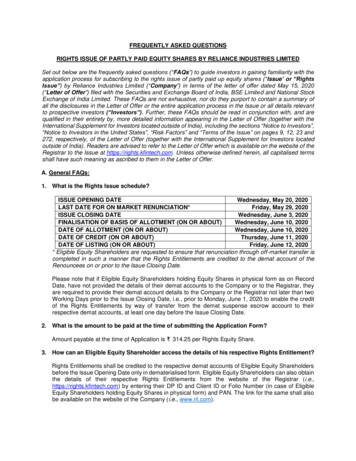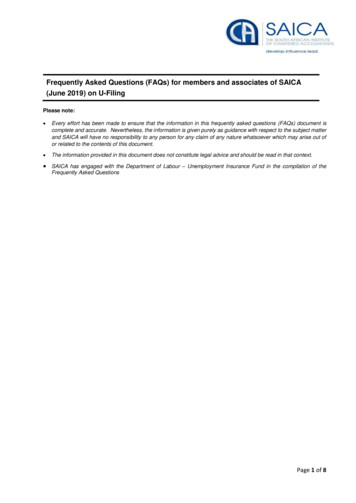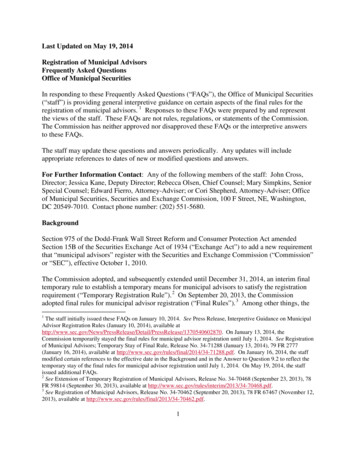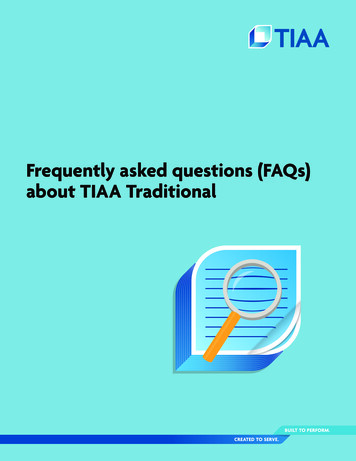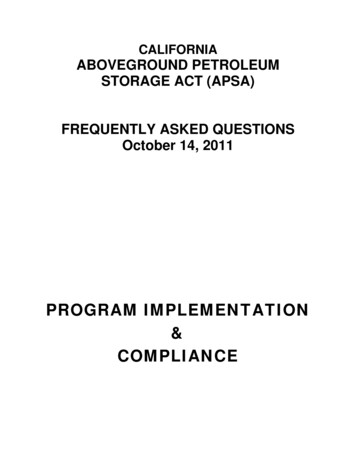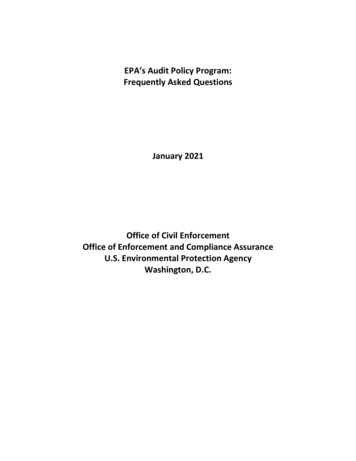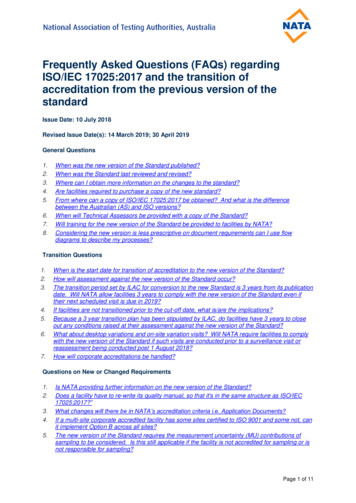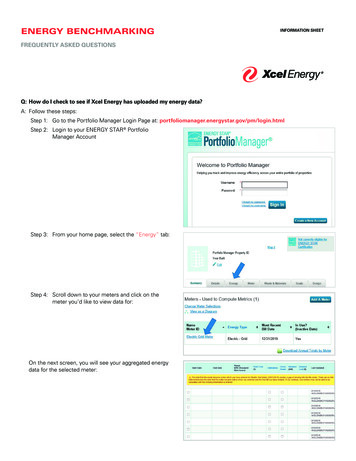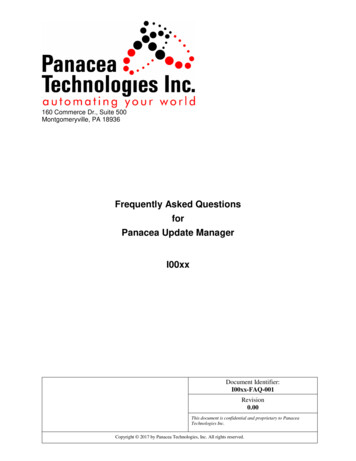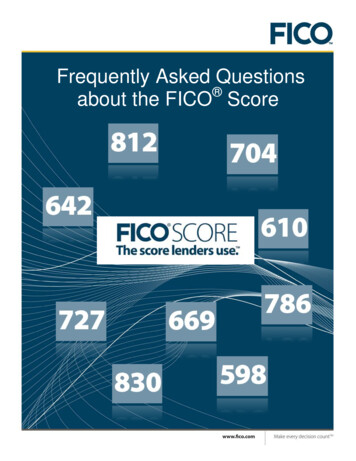
Transcription
FICO Score Open Access Consumer Credit Education – US VersionFrequently Asked Questions about the FICO Score 2012 Fair Isaac Corporation. All rights reserved.1January 01, 2012
Frequently Asked Questions about the FICO ScoreTable of ContentsAbout the FICO Score . 1What is a credit score? . 1 What is the FICO Score? . 1 What is a good FICO Score? . 1 What is the lowest and highest possible FICO Score? . 2 Is the FICO Score the only risk score? . 2Why is my score at each of the three consumer reporting agencies different? . 2 Why is my FICO Score different than other scores I’ve seen?. .3 Why does my FICO Score fluctuate/change?.3 What are the minimum requirements to produce a FICO Score? . 3What are Key Score Factors? . 3Who or what is FICO? . 3Access to Credit . 4 Does my FICO Score alone determine whether I get credit? . 4How is a credit history established? . 4How can I responsibly manage my financial health? . 4How long will negative information remain on my credit file? . 6 Does my FICO Score change that much over time? . 6What if I’m turned down for credit? . 7How do I get my free credit report?. 7Can I transfer my credit file from another country to the US consumer reportingagencies? . 7Why did my lender lower my credit limit? . 7Credit Card Impacts to Score. 8Should I take advantage of promotional credit card offers? . 8 Will closing my credit card account impact my FICO Score?. 8What’s the best way to manage my growing credit card debt? . 9Mortgage Impacts to Score . 10 Are the alternatives to foreclosure any better as far as my FICO Score isconcerned? . 10 How does a mortgage modification affect a borrower’s FICO Score?. 10 2013-2014 Fair Isaac Corporation. All rights reserved.i
Frequently Asked Questions about the FICO Score Will contacting my mortgage servicer affect my FICO Score? . 10 How does refinancing affect my FICO Score? . 10 How do loan modifications affect my FICO Score? . 11 How long will a foreclosure affect my FICO Score? . 11Student Loan Impacts to Score. 12 How does the FICO Score consider student loan shopping? . 12What’s the best advice for people shopping for student loans to minimize the impact to their FICO Score? . 12Bankruptcy and Public Record Impacts to Score . 13 What are the different categories of late payments and do they affect my FICOScore?. 13 How will a FICO Score consider a bankruptcy, and how can I minimize anynegative effects? . 13What are the different types of bankruptcy and how is each considered my FICO Score? . 14 How do public records and judgments affect my FICO Score? . 14 Credit missteps – how their effects on the FICO Score varies. 14General Impacts to Score. 17 What are inquiries and how do they affect my FICO Score? . 17 Does applying for many new credit accounts hurt my FICO Score more thanapplying for just a single new account? . 18Is there a best way to go about applying for new credit to minimize the effect to my FICO Score? . 18 Is the FICO Score unfair to minorities? . 19 How is the FICO Score calculated for married couples? . 19 Will spending less and saving more impact my FICO Score? . 19If lenders have different lending requirements, how can I know if I qualify foraffordable financing?. 20 Can accounts that aren’t in my credit files affect my FICO Score? . 20 2013-2014 Fair Isaac Corporation. All rights reserved.ii
Frequently Asked Questions about the FICO ScoreAbout the FICO ScoreWhat isa creditscore?A credit score is a number that summarizes your credit risk. The score is based on a snapshot of yourcredit file at one of the three major consumer reporting agencies (CRAs) Equifax, Experian andTransUnion at a particular point in time, and helps lenders evaluate your credit risk. Your creditscore influences the credit that’s available to you and the terms, such as interest rate, that lendersoffer you.What istheFICO Score?The credit score most widely used in lending decisions is the FICO Score, the credit score createdby Fair Isaac Corporation (FICO). Lenders can request the FICO Score from all three majorconsumer reporting agencies (CRAs). Lenders use the FICO Score to help them make billions ofcredit decisions every year. FICO develops the FICO Score based solely on information in consumercredit files maintained at the CRAs. Understanding your FICO Score can help you better understandyour credit risk and allow you to effectively manage your financial health. A good FICO Scoremeans better financial options for you.What isa goodFICO Score?The point above which a lender would accept a new application for credit, but below which, thecredit application would be denied, is known as the “score cutoff”. Since the score cutoff varies bylender, it’s hard to say what a good FICO Score is outside the context of a particular lendingdecision. For example, one auto lender may offer lower interest rates to people with a FICO Scoreabove, say, 680; another lender may use 720, and so on. Your lender may be able to give youguidance on their criteria for a given credit product.The chart below provides a breakdown of FICO Score ranges found across the U.S. consumerpopulation. It provides general guidance on what a particular FICO Score represents. Again, eachlender has its own credit risk standards. 2013-2014 Fair Isaac Corporation. All rights reserved.1
Frequently Asked Questions about the FICO ScoreWhat isthe lowestandhighestpossibleFICO Score?The classic FICO Score which is in use today by the vast majority of lenders fall within the300-850 score range. This score range was introduced to establish an easy-to-understand,common frame of reference for lenders and consumers. Industry-specific FICO Scores, suchas those for auto lending or credit card lending, were developed to accommodate the uniquecharacteristics of their respective industry and range from 250-900. Some lenders also useFICO Score NG, which ranges from 150-950.Is theFICO Score theonly riskscore?No. While the FICO Score is the most commonly used credit risk score by lenders in the US,lenders may use other scores to evaluate your credit risk. These include: Why is myscore ateach ofthe threeCRAsdifferent?FICO Application risk scores. Many lenders use scoring systems that include aFICO Score but also consider information from your credit application.FICO Customer risk scores. A lender may use these scores to make credit decisionson its current customers. Also called “behavior scores,” these scores generallyconsider a FICO Score along with information on how you have paid that lender inthe past.Other credit scores. These scores may evaluate your credit file(s) differently thanthe FICO Score, and in some cases a higher score may mean more risk, not less riskas with the FICO Score. The FICO Score is the score most lenders use whenmaking credit decisions.In general, when people talk about “your credit score,” they’re talking about your FICO Score. But in fact, your FICO Score is calculated separately by each of the three consumerreporting agencies (CRAs) using a formula that FICO has developed. It’s normal to have aslightly different FICO Score from those agencies for any of the following reasons: Your FICO Score is based on the credit information in your credit file at aparticular CRA at the time your score is calculated. The information in your creditfiles is supplied by lenders, collection agencies and court records. Some of thesesources may provide your information to just one or two of the CRAs, not all three.Differences in the underlying credit data will often result in differences in yourFICO Score.You may have applied for credit under different names (for example, Robert Jonesversus Bob Jones) or a maiden name, which may cause fragmented or incompletefiles at the CRAs. In rare situations, this can result in your credit files not havingcertain account information, or including information that should be on someoneelse’s credit files. This is one reason why it is important for you to review yourcredit files at least annually. Lenders may report your credit information to one credit reporting agency today,and to another credit reporting agency tomorrow. This can result in one agencyhaving more up-to-date information which in turn can cause differences in yourFICO Score from both agencies. The CRAs may record the same information in slightly different ways which canaffect your FICO Score. 2013-2014 Fair Isaac Corporation. All rights reserved.2
Frequently Asked Questions about the FICO ScoreWhy is myFICO Scoredifferentthan otherscores I’veseen?There are many different credit scores available to consumers and lenders. The FICO Score isthe credit score used by most lenders, but different lenders (such as auto lenders and creditcard lenders) may use different versions of the FICO Score. In addition, your FICO Score isbased on credit file data from a particular consumer reporting agency, so differences in yourcredit files may create differences in your FICO Score. The FICO Score that is being madeavailable to you through this program is the specific score that we use to manage youraccount. When reviewing a score, take note of the date, bureau credit file source, score type,and range for that particular score.Why doesmy FICO Scorefluctuate/change?There are many reasons why your score may change. Your FICO Score is calculated eachtime it is requested, taking into consideration the information that is in your credit file from aparticular consumer reporting agency at that time. So, as the information in your credit file atthat bureau changes, your FICO Score can also change. Review your key score factors, whichexplain what factors from your credit report most affected a score. Comparing key scorefactors from the two different time periods can help identify causes for a change in a FICO Score. Keep in mind that certain events such as late payments or bankruptcy can lower yourFICO Score quickly.What aretheminimumrequirements toproduce aFICO Score?There’s really not much to it; in order for a FICO Score to be calculated, a credit file mustcontain these minimum requirements: At least one account that has been open for six months or more At least one undisputed account that has been reported to the credit reportingagency within the past six months No indication of deceased on the credit file (Please note: if you share an account withanother person and the other account holder is reported deceased, it is important tocheck your credit file to make sure you are not impacted)Minimum scoring criteria may be satisfied by a single trade line, provided the trade line doesnot contain disputed information or any indication on the credit file that the subject isdeceased. This means that if you dispute all of your trade lines, a FICO Score will not be ableto be calculated.Note: These minimum requirements vary slightly for the FICO Score NG.What areKey ScoreFactors?When a lender receives your FICO Score, "key score factors" are also delivered, which are thetop factors that affect the score. Addressing some or all of these key score factors can helpyou improve your financial health over time. Having a good FICO Score can put you in abetter position to qualify for credit or better terms in the future.Who orwhat isFICO?Founded in 1956, Fair Isaac Corporation (FICO) uses advanced math and analytics to helpbusinesses make smarter decisions. One of FICO’s inventions is the FICO Score, which is themost widely used credit score in lending decisions. It is important to note that while FICOworks with the consumer reporting agencies (CRAs) to provide your FICO Score, it does nothave access to or store any of your personal data or determine the accuracy of theinformation in your credit file. 2013-2014 Fair Isaac Corporation. All rights reserved.3
Frequently Asked Questions about the FICO ScoreAccess to CreditDoes myFICO Scorealonedeterminewhether Iget credit?No. Most lenders use a number of factors to make credit decisions, including your FICO Score. Lenders may look at information such as the amount of debt you can reasonablyhandle given your income, your employment history, and your credit history. Based ontheir review of this information, as well as their specific underwriting policies, lenders mayextend credit to you even with a low FICO Score, or decline your request for credit evenwith a high FICO Score.How is acredithistoryestablished?There are a few ways to establish a credit history, including the following. Apply for and open a new credit card. A person with no or little credit history maynot get very good terms on this credit card such as a high annual percentagerate (APR). However, by charging small amounts and paying off the balance eachmonth, you won’t be paying interest each month so the high APR won’t hurt yourfinancial position. Open a secured credit card. Those unable to get approved for a traditional creditcard may open a secured credit card to build credit history, provided the cardissuer reports secured cards to the consumer reporting agency. This type of cardrequires a deposit of money with the credit card company. Charges can then bemade on the secured card, typically up to the amount deposited.With both traditional and secured credit cards, it is important to keep balances low, pay offbalances each month and never miss a payment. This will help develop positive financialhealth.How can Iresponsiblymanage myfinancialhealth?The best advice is to manage your financial responsibilities over time. Your FICO Scorereflects credit payment patterns over time with more of an emphasis on recently reportedinformation than older information. Below are some general tips to follow for improvingyour financial health: Focus on the key score factors we provided with your FICO Score. Theserepresent the main areas of credit practices that you should address toresponsibly manage your financial health. Apply for and open new credit accounts only as needed. Generally, openingaccounts solely for a better credit picture probably won’t impact a FICO Scoreand, in some instances, may even lower the score. Pay off your bills on time. Collections and delinquent payments, even if only a fewdays late, can have a major negative impact on your FICO Score. If you have missed payments, get current and stay current. The longer you pay yourbills on time after being late, the better your financial health. Older credit problemshave less impact on your FICO Score than recent ones, so poor credit performancewon’t haunt you forever. The impact of past credit problems on your FICO Scorefades as time passes and as recent good payment patterns show up on your creditfile. And your FICO Score weighs any credit problems against the positive 2013-2014 Fair Isaac Corporation. All rights reserved.4
Frequently Asked Questions about the FICO Scoreinformation that indicates that you’re managing your financial health well. If you are having trouble making ends meet, contact your creditors or see alegitimate credit counselor to see if they can help. If you can begin to manageyour financial health and pay on time, your financial picture should improve overtime. And seeking assistance from a credit counseling service will not hurt yourFICO Score. Keep balances low on credit cards and other “revolving credit”. High outstandingcredit card debt can negatively impact your FICO Score. Pay off debt rather than move it around from one credit card to another. Themost effective way to improve financial health in this area is by paying down totalrevolving (credit card) debt. Credit history can be re-established after problems in the past, such as abankruptcy, by opening new accounts responsibly and paying them on time. Rather than purposely paying off and closing credit cards, manage credit cardsresponsibly by keeping balances well under the credit limit. In general, havingcredit cards and installment loans (and making timely payments) will positivelyimpact your financial health. People with no credit cards, for example, tend to behigher risk than people who have managed credit cards responsibly. Do your rate shopping for a loan within a focused period of time. Too many“inquiries” the number of requests from a lender for your credit reports whenyou apply for loans can negatively affect a FICO Score. However, the FICO Score treats multiple inquiries from auto, mortgage, or student loan lenderswithin a short period of time as a single inquiry because when purchasing a houseor a car it is customary to shop for the best rate, resulting in more inquiries. Don’t close unused credit cards as a short-term strategy to help your FICO Score.This approach could backfire and actually lower your FICO Score. If you have been using credit for only a short time, don’t open a lot of newaccounts too quickly, as rapid account build-up can lower your score. 2013-2014 Fair Isaac Corporation. All rights reserved.5
Frequently Asked Questions about the FICO ScoreHow longwillnegativeinformationremain onmy creditfile?It depends on the type of negative information. Here’s the basic breakdown of how longdifferent types of negative information will remain on your credit file: Late payments: 7 years Bankruptcies: 7 years for a completed Chapter 13, and 10 years for Chapters 7and 11 Foreclosures: 7 years Collections: Generally, about 7 years, depending on the age of the debt beingcollected Public Record: Generally 7 years, although unpaid tax liens can remain indefinitelyKeep in mind: For all of these negative items, the older they are the less impact they willhave on your FICO Score. For example, a collection that is 5 years old will hurt much lessthan a collection that is 5 months old.Does myFICO Scorechange thatmuch overtime?It’s important to note that your FICO Score is calculated each time it’s requested; eitherby you or a lender. And each time it’s calculated, it’s taking into consideration theinformation that is in your credit file at a particular consumer reporting agency at thattime. So, as the information in your credit file changes, your FICO Score can also change.How much your FICO Score changes from time to time is driven by a variety of factorssuch as: Your current credit profile how you have managed your financial health to datewill affect how a particular action may impact your score. For example, newinformation in your credit file, such as opening a new credit account, is more likelyto have a larger impact for someone with a limited credit history as compared tosomeone with a very full credit history. The change being reported the “degree” of change being reported will have animpact. For example, if someone who usually pays bills on-time continues to do so(a positive action) then there will likely be only a small impact on his or her FICO Score one month later. On the other hand, if this same person files for bankruptcyor misses a payment, then there will most likely be a substantial impact on theirscore one month later. How quickly information is updated there is sometimes a lag between when youperform an action (like paying off your credit card balance in full) and when it isreported by the creditor to the consumer reporting agencies. It’s only when theconsumer reporting agency has the updated information that your action willhave an effect on your FICO Score.Keep in mind: Small changes in a score can be important to obtain a certain FICO Score level or to reach a certain lender’s FICO Score “cutoff” (the point above which alender would accept a new application for credit, but below which, the creditapplication would be denied). 2013-2014 Fair Isaac Corporation. All rights reserved.6
Frequently Asked Questions about the FICO ScoreWhat if I’mturneddown forcredit?If you have been turned down for credit, the Equal Credit Opportunity Act (ECOA) givesyou the right to obtain the reasons why within 30 days. You are also entitled to a free copyof your credit reports within 60 days, which you can request from each of the consumerreporting agencies. If your FICO Score was a primary part of the lender’s decision, thelender may use the key score factors or reason codes to explain why you didn’t qualify forthe credit.How do Iget my freecreditreport?You can get one credit report from each of the three major consumer reporting agenciesonce every 12 months.Can Itransfer mycredit filesfromanothercountry tothe USconsumerreportingagencies?Credit files and credit histories do not transfer from country to country. There are legal,technical and contractual barriers that prevent a person from transferring their credit filesor history to a different country. Unfortunately, this often means that a new immigrant tothe US will need to establish a new credit history.Why did mylenderlower mycreditlimit?Some banks are lowering credit lines and closing credit card or revolving accounts thathave had little or no recent activity. These actions can hurt your score if they result inhigher credit utilization (proportion of balance to credit limit); therefore, you’re going towant to preserve your credit lines by keeping your credit card accounts open and usingthem frequently while, at the same time, maintaining low balances. 2013-2014 Fair Isaac Corporation. All rights reserved.7
Frequently Asked Questions about the FICO ScoreCredit Card Impacts to ScoreShould Itakeadvantageofpromotionalcredit cardoffers?Generally, it’s not good to accept promotional credit card offers just because you are beingoffered them. Opening new accounts can indicate increased risk to lenders and can hurtyour FICO Score. Every individual’s situation is unique, but as a general rule, you shouldonly apply for credit when you need it, or if you are new to credit and want to establishcredit history.Will closinga creditcardaccountimpact myFICO Score?Yes, but not in the way you might expect. We never recommend closing a credit card forthe sole purpose of helping your financial health.This may sound a bit counter-intuitive; after all, cleaning up your credit profile by gettingrid of old or unused credit cards sounds like a good idea – and it may be from an overallfinancial health management perspective. If you are tempted to charge more than youshould just because you have more credit available, then getting rid of that temptation byclosing some credit cards might be your best course of action.However, your FICO Score takes into consideration something called a “credit utilizationratio”. This ratio or proportion basically looks at your total used credit in relation to yourtotal available credit; the higher this ratio is, the more it can negatively affect your FICO Score. This is because, in general, people with higher credit utilization ratios are more likelyto default on loans. So, by closing an old or unused card, you are essentially wiping awaysome of your available credit and thereby increasing your credit utilization ratio.It’s a bit tricky, so here’s an example:Say you have three credit cards. Credit card 1 has a 500 balance and a 2,000 credit limit.Credit card 2 is an unused card with a zero balance and a 3,000 limit.Credit card 3 has a 1,500 balance and a 1,500 limit.In this scenario your credit utilization ratio looks like this:Total balances 2,000 ( 500 0 1,500)Total available credit 6,500 ( 2,000 3,000 1,500)Credit utilization ratio 30% (2,000 divided by 6,500)Now, if you decide to close credit card 2 because it’s an old card that you never use,your credit utilization ratio looks like this:Total balances 2,000 ( 500 1,500)Total available credit 3,500 ( 2,000 1,500)Credit utilization ratio 57% (2,000 divided by 3,500)You can see that your utilization ratio rose from 30% to 57% by closing the unusedcredit card. 2013-2014 Fair Isaac Corporation. All rights reserved.8
Frequently Asked Questions about the FICO ScoreWhat’sthe bestway tomanagemygrowingcreditcarddebt?There are a number of different things to consider when managing credit card debt. We’lltouch on a few of the key things of which to be aware.Avoid a single credit cardIf you only have one credit card available and you’re coming close to maxing out that card,you might consider applying for another card. Having only a single credit card can be risky.If an emergency like an unexpected hospital stay hits, do you have a way to pay for it? Youshould always try to keep an unused, available amount of credit for an emergency.Another reason to consider opening an additional card has to do with what’s called creditutilization. Utilization measures how much of your credit you are using in relation to yourtotal available credit. If you have one credit card with 500 charged to it and a credit limitof 1,000, then your utilization is 50%. There’s no ideal utilization to shoot for, because aswith most things, it depends on everything else on your file. But as a general rule, youwant to try to keep your utilization on any one card, and across all of your credit cards,below 50% to avoid the risk of hurting your FICO Score. Research has shown that peoplewho max out a single credit card are more likely to miss future payments, and thereforethe FICO Score considers people using more of their available credit more risky thanpeople who are using very little of their available credit.Avoid a large number of credit cardsAt the other end of the spectrum, maintaining a large number of credit cards cancomplicate your financial health management. The more cards you have, the more likely itis that you will simply miss seeing a bill and making a payment. Paying your bills on time,even if it is the minimum amount required, is one of the most important things you can doto avoid damaging your credit. Make sure you are comfortable managing the number ofcards you have and your total minimum payment obligation so you can remain current.If you have a lot of cards and it feels unmanageable, one instinct may be to close thosecards so you don’t have to worry about them. Do what you need to in order to remove thetemptation to use it, but generally we recommend that you keep the account open with nobalance. Closing an account reduces the amount of available credit you have, and as aresult your credit utilization will go up.Don’t forget about APRsIn addition to the number of cards, their limits and the amount you use them, it’s alsoimportant to consider the annual percentage rate (APR) of each card you are using. APRsare not currently reported by credit card companies to the consumer reporting agencies(CRAs), and therefore they are not explicitly considered when computing your FICO Score.However, you should definitely know the APR of all your cards so you can add debt, ifnecessary, to a low APR card and pay it off from a high APR card.After you’ve paid off cards with higher APRs, you devote less money towards interest andhave more money available to pay down your other balances. 2013-2014 Fair Isaac Corporation. All rights reserved.9
Frequently Asked Questions about the FICO ScoreMortgage Impacts to ScoresAre thealternativesto foreclosure anybetter as faras my FICO Score isconcerned?The common alternatives to foreclosure, such as sho
How does the FICO Score consider student loan shopping? . The score is based on a snapshot of your credit file at one of the three major consumer reporting agencies (CRAs) Equifax, Experian and TransUnion at a particular point in time, and helps lenders evaluate your credit risk. Your credit


